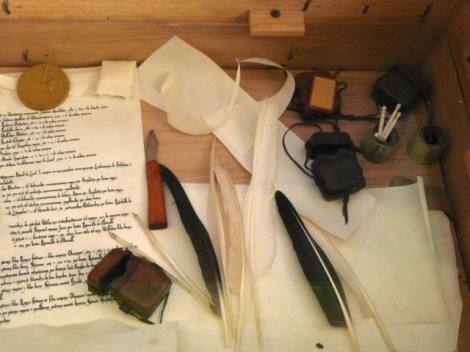I set my time travel machine to 1848 and pulled up in front of a huge Georgian mansion in what is now known as Bondi.
 To be ushered into the Fordham’s drawing room by the ever faithful Miller, was an experience in itself. That is, until I saw the grandeur which surrounded me. Such luxurious furnishings and dark oaken furniture, decorative tapestries and velvet curtains—it all said just how much a man of good taste Mr Fordham is.
To be ushered into the Fordham’s drawing room by the ever faithful Miller, was an experience in itself. That is, until I saw the grandeur which surrounded me. Such luxurious furnishings and dark oaken furniture, decorative tapestries and velvet curtains—it all said just how much a man of good taste Mr Fordham is.
Unsettled and nervous, I sat gingerly on the chaise lounge and waited, fidgeting with my iPod, until the esteemed couple appeared.
Mr Fordham’s charisma filled the room the moment he entered and Meg’s serene beauty matched it completely. I stood to my feet, at once intimidated by their presence.
They put me to shame with their humility and politeness. Mrs Fordham curtsied and Mr Fordham bowed over my hand, while I stood their blushing to my roots.
Jack: Are you well Mrs Deed?
He spoke with kindness. I suppose he saw my heightened colour.
Amanda: I am very well, thank you. Just all aflutter that I am finally meeting you.
My stuttering must have made me look like a silly school-girl.
Meg: (With a twinkle in her eye) Never mind Missus Deed, he seems to have that effect on everyone.
Amanda: (Finally I found my smile) I have heard of his reputation. Do women everywhere still fall for him?
Mr Fordham laughed and Meg joined him. She rolled her eyes.
Meg: Shhh. I am trying to keep the truth from him. I am afraid it will go to his head.
Jack looked at her affectionately and gently pinched her arm.
Jack: Shall we sit? I am sure you would be more comfortable.
Meg: Can we offer you refreshment?
We sat down together and I declined their hospitality, instead busying myself with setting up my iPod to record.
Amanda: So, how are you both enjoying married life?
Meg: I could not have made a better choice. I tease him about how the young girls still melt at the sight of him, but he takes no notice of them.
Jack: I only have eyes for my little rogue here. I still cannot believe she agreed to marry me. I don’t deserve her, you know.
Meg: Doing it much too brown, I think, my dear!
Jack: (Sighs dramatically) Very well, she makes my life miserable. (He turns to Meg.) Is that better love?
 Meg: (Laughing) You will not get a serious answer from him, you know.
Meg: (Laughing) You will not get a serious answer from him, you know.
They are obviously very much in love. Their eyes say it all.
Amanda: How is young Jonathon?
Meg: He is four years old now. He’s very handsome, and very like his father, except for the big green eyes. He has a love for horses like his pa, too, isn’t that right dear?
Mr Fordham merely nods. He has strangely become quiet, but still smiles.
Amanda: Do you have any other children?
Meg: We have two girls. Winifred is two and Ann is six months. They are so beautiful.
Amanda: Winifred?
Meg: We call her Winnie for short.
Amanda: Ah, as you once were called by the Sainsbury children. What a lovely idea. Mister Fordham you must be so proud.
Jack: (Nods again) Words cannot express…they are a blessing beyond description.
Meg: Jack has becomes rather mawkish when you talk about his children. Not an ounce of steel in him. Just like butter.
Amanda: I see. We would say ‘sooky la-la’, I think.
Jack: What…?
I cannot help but laugh at his expression. Perhaps I should not have used a modern term, because it diverted his attention.
Jack: What is that contraption you have, anyway?
Amanda: This? (I wave the iPod) It’s an iPod.
Jack: Eye pod? Is that a new type of quizzing glass?
Amanda: (Laughing) No. Capital I – Pod. It is a recording device. It plays music, too.
Jack: (Frowns) How can music be in something so tiny? Impossible!
I plug the headphones in and hold them out to his ears.
Amanda: Here. Listen.
Mr Fordham pulls a disgusted face.
Jack: That is not music.
Oops! I played a rock track. I quickly found some classical music.
Amanda: Sorry, Mr Fordham. Try this.
Mr Fordham’s eyes widen.
Jack: That is astounding. Really quite remarkable.
Meg: May I hear?
Mr Fordham passes the ear phones to Meg. Her eyes also become round.
M: How is it so?
Amanda: Many things have been invented since the 1840s. We call it ‘modern technology’.
Mr Fordham leans forward with interest.
Jack: What are the horses like?
Amanda: Well, horses are more used recreationally now, or for racing.
Jack: (Looks scandalised) No! How do people draw their carriages and travel?
Amanda: Cars.
Jack: Cars?
Amanda: Cars with engines in them which make them drive without the need of horses.
Jack: Do you mean those steam engines I’ve heard about?
Amanda: No. They’ve got better engines than that now.
Jack: I should like to see that.
I fiddle with my iPod again.
 Amanda: I think, in my time, you would drive a Ferrari. This is a picture of one.
Amanda: I think, in my time, you would drive a Ferrari. This is a picture of one.
Jack: (Shock and admiration) This is a car?
Amanda: This is a ‘sweet goer’ as you would say. One of the best you can get.
Jack: And it needs no horses?
Amanda: Imagine the power of six hundred horses. That is how powerful it is.
Jack: (Amazed) Six hundred! How fast does it go?
Amanda: Up to two hundred and five miles per hour.
Mr Fordham is left speechless by this, but soon rallies.
Jack: And this is a picture of it, you say? It seems as though I merely look through a window. Are you certain this is not a new style of monocle?
Amanda: (Shakes head) Modern photography is in colour and very clear.
Jack: A photograph? That is a photograph inside your I…Pod?
Mr Fordham runs his hands through his hair in disbelief and lets out an awe-filled breath.
Meg: Jack, Missus Deed did not come here to talk about her time, but to talk about us. You should not distract her.
Jack: Maybe so, my dear, but I think I would like one of those cars. Is it possible for us to travel back with you?
Amanda: (I realised I had said too much about the future.) Perhaps I will have some refreshment after all.
…to be continued…
 From the Back Cover
From the Back Cover D. J. Blackmore was born and raised in the coal mining and wine growing Hunter Valley, New South Wales, Australia. She has milked cows and made cheese. She has reared babies, border collies and kept bees. A short stint with horses saw her break her best arm. Now she steers clear of animals of the equine persuasion. You might see her with a laptop and a head full of ideas. Being a mother to five is her highest achievement, but writing comes a close second. Her and her writing are inseparable as old friends.
D. J. Blackmore was born and raised in the coal mining and wine growing Hunter Valley, New South Wales, Australia. She has milked cows and made cheese. She has reared babies, border collies and kept bees. A short stint with horses saw her break her best arm. Now she steers clear of animals of the equine persuasion. You might see her with a laptop and a head full of ideas. Being a mother to five is her highest achievement, but writing comes a close second. Her and her writing are inseparable as old friends.


 1. Teachers each day will fill lamps, trim wicks and clean chimneys.
1. Teachers each day will fill lamps, trim wicks and clean chimneys.











